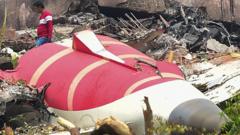India's Aircraft Accident Investigation Bureau (AAIB) is currently evaluating whether to send the flight data and cockpit voice recorders from the recent Air India crash overseas for decoding. The Boeing 787-8 Dreamliner, which was headed to London, crashed shortly after takeoff from Ahmedabad airport, resulting in the loss of at least 270 lives, primarily passengers. Although some reports indicated that the black boxes may be dispatched internationally, the civil aviation ministry clarified that no conclusive decision has yet been made.
The AAIB is tasked with assessing various technical, safety, and security factors before determining where to analyze the recovered Enhanced Airborne Flight Recorders (EAFRs). The two critical black boxes from the Boeing crash were retrieved from the site, and they are essential for reconstructing the final moments of the flight, which will help identify the cause of the devastating incident.
However, preliminary reports suggest that the recorders may have suffered significant damage in the post-crash fire, potentially complicating data extraction efforts within India. There is also discussion of potentially sending one set of recorders to the United States to cross-reference data with the National Transportation Safety Board (NTSB). Former AAIB investigator Captain Kishore Chinta stated that, despite the recent inauguration of the new AAIB lab in Delhi, it remains uncertain whether it is fully equipped to download data from the EAFRs.
In a related statement, Air India's chairman revealed that one of the engines involved in the crash was new, while the other was not due for servicing until December. The airline has since completed inspections on the majority of its Boeing 787 fleet, ensuring that 26 of the 33 aircraft have been cleared to resume operations. Following the tragedy, India's aviation regulator mandated additional safety evaluations for the Boeing 787s.
Amid ongoing investigations, Air India announced operational changes, including reduced flights on 16 international routes and the temporary suspension of services to three overseas destinations from June 21 to July 15. These adjustments are intended to facilitate enhanced safety checks and address increased flight durations caused by airspace closures in the Middle East.
The AAIB is tasked with assessing various technical, safety, and security factors before determining where to analyze the recovered Enhanced Airborne Flight Recorders (EAFRs). The two critical black boxes from the Boeing crash were retrieved from the site, and they are essential for reconstructing the final moments of the flight, which will help identify the cause of the devastating incident.
However, preliminary reports suggest that the recorders may have suffered significant damage in the post-crash fire, potentially complicating data extraction efforts within India. There is also discussion of potentially sending one set of recorders to the United States to cross-reference data with the National Transportation Safety Board (NTSB). Former AAIB investigator Captain Kishore Chinta stated that, despite the recent inauguration of the new AAIB lab in Delhi, it remains uncertain whether it is fully equipped to download data from the EAFRs.
In a related statement, Air India's chairman revealed that one of the engines involved in the crash was new, while the other was not due for servicing until December. The airline has since completed inspections on the majority of its Boeing 787 fleet, ensuring that 26 of the 33 aircraft have been cleared to resume operations. Following the tragedy, India's aviation regulator mandated additional safety evaluations for the Boeing 787s.
Amid ongoing investigations, Air India announced operational changes, including reduced flights on 16 international routes and the temporary suspension of services to three overseas destinations from June 21 to July 15. These adjustments are intended to facilitate enhanced safety checks and address increased flight durations caused by airspace closures in the Middle East.

















